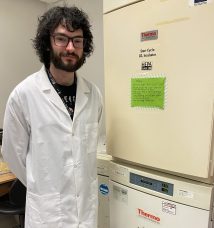Discovery of novel long non coding RNAs for early detection and monitoring of treatment response in ovarian cancer

Shaun Hartigan
Ovarian cancer is the deadliest female cancer worldwide, with a low survival rate. Most cases are detected too late when the cancer has already spread to other organs. It is difficult to diagnose early because symptoms are not specific to the disease itself.
Presently, there are no specific methods to detect the disease in its early stages. Over 90% of cases with the most common form of ovarian cancer have a mutation in a cellular component known as p53. This is a protein that keeps our cells in check, preventing them from growing and dividing out of control. Mutations in p53 stop it from working properly. p53 normally recognises and binds to specific regions in our DNA, activating the assembly of vital proteins in response to cell stress. This protects our cells from damage and halts the onset of cancer.
My project will examine what happens to a group of RNA molecules when p53 does not work correctly in ovarian cancer. By looking at how mutations in p53 affect these RNAs, we think that detecting the group of RNA molecules will be a warning sign that cancer has started or will be able to tell us how the cancer has responded to medicines. Although this project is specific to ovarian cancer, mutations of p53 are found in many cancer types. The results of my project could be used to identify cancer at its earliest and most treatable stage, and this will help many people, not only those with ovarian cancer.
Back








 Contact
Contact